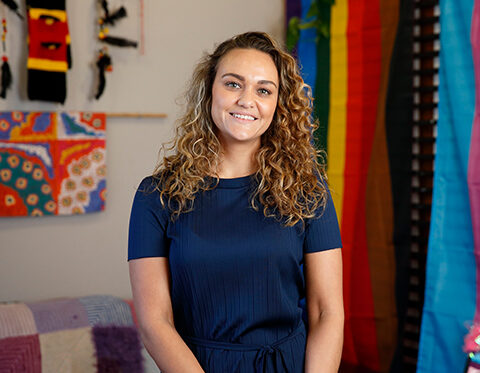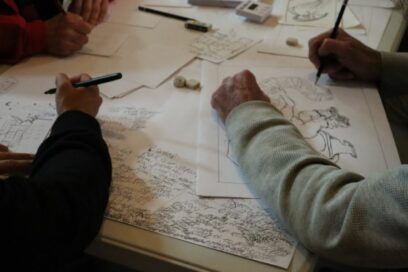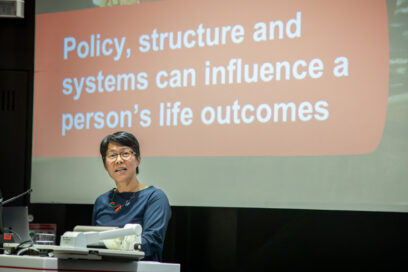What is trauma-informed care and why is it important?
Trauma-informed care is about changing the way we perceive the people we serve:
Trauma-informed care does not focus on people’s problems; instead we aim to meet people where they are at, understanding that something may have happened in their past.
A trauma-informed approach includes a person’s interaction with our staff, the delivery and type of services we offer, and the physical environment we deliver our services from.
Trauma-informed care principles
Employing trauma-informed practice at Sacred Heart Mission means adhering to the following principles:
- Trauma awareness
Staff and volunteers are all required to undertake one of three levels of trauma-informed training appropriate to their position in order to recognise trauma symptoms and respond appropriately. - Promote safety
As trauma survivors often feel at risk of further trauma, a sense of both physical and emotional safety are important to recovery. - Rebuilding control
Trauma is disempowering, as is homelessness. Trauma-informed services offer a predictable environment to allow people to rebuild a sense of efficacy and control over their lives. Predictable and reliable relationships with workers also reinforce healthy boundaries and help-seeking behaviour. - Promote connection
Social networks play a critical role in promoting resilience and recovery. Ideally, trauma survivors will develop healthy connections with friends, family and significant others. - Focus on strengths and resources
We support people to identify their own strengths and develop or enhance their personal coping skills. While we acknowledge the challenges people have experienced, we support people to articulate and work toward their hopes for the future. - Maintaining a belief in recovery
This principle reminds us that people can and do recover from trauma. Conveying hope emphatically requires us to understand the barriers to recovery including lack of financial resources or living in unsafe or chaotic environments.
When we support people we maintain a ‘do no harm’ approach, where we do not re-traumatise or blame the victim. If trauma survivors experience services as unsafe, disempowering and/or invalidating they may withdraw from seeking support.

The benefits of trauma-informed care when working with people experiencing homelessness
Most of the people we support have survived violence and ongoing abuse as children and through their adult life.
Trauma can have a long-lasting effect on all aspects of someone’s life, on their brain chemistry and how they think, feel and behave. It’s the consequence of a shocking, terrifying, devastating experience that is either:
- life-threatening (e.g. abuse or assault), or
- threatening to someone’s physical integrity or sense of self (e.g. rape or sexual assault).
At Sacred Heart Mission we see how a person’s mental health is affected by trauma and how trauma can affect people’s ability to communicate and connect with others.
We see first-hand how a history of violence and relentless danger can affect a person’s ability to look after themselves, feel safe, and be connected in healthy ways to other people.
Trauma is more complex and severe when it is caused by the actions of other people.
Through research on trauma and its impacts on people we’re able to better understand people experiencing homelessness and more effectively support their recovery journeys.
Acknowledging violence and its potential lifelong effects as part of our trauma-informed approach helps us understand the challenges faced by people who have experienced trauma, impacting them biologically, socially, and psychologically.
Trauma and homelessness
Homelessness often starts when people try to get away from danger.
Unfortunately, experiencing homelessness also puts people at risk. Trauma affects and prolongs a person’s homelessness: it is a vicious cycle, and it constantly leads people down a path where they feel unsafe.
When we meet someone at a Sacred Heart Mission Engagement Hub for the first time, that person is likely to have experienced an average of 21 traumas in their life. The frequency and severity of trauma and the role other people play in that trauma creates fear: a constant fear of what others might do to them.
When a person is physically and sexually abused by those who are supposed to care for and protect them, it can be very difficult to connect with someone who can help. Trust is not built easily.
At Sacred Heart Mission we know how difficult it is to reach and engage with someone whose life has been profoundly shaped by trauma. Our workers, who take on the daily challenge of walking alongside people with large and diverse histories of trauma, need a high level of ongoing training and support.
Being trauma informed is about understanding the massive challenges people face daily. We aim to meet people where they are at and understand what they have had to contend with.
Recovering from trauma
We know people can recover from trauma. We have learnt from the people we serve that, with the right support and with enough stability and safety, people can learn to manage the effects of trauma on their lives.
When a person is understood and given opportunities to be welcomed and feel socially included they can connect meaningfully with others and find ways of contributing in their community.
Additional trauma-informed care resources
The Trauma and Homelessness Initiative was a collaborative project by Sacred Heart Mission, MIND Australia, Inner South Community Health and VincentCare Victoria aiming to achieve better outcomes for people experiencing long-term homelessness and trauma.
How we’ve supported our community

92,822 nutritious takeaway meals were served at our Meals Program in 2020/21.

1,766 times, Pathways Workers at Sacred Heart Central provided support over the past year.

529 times, women presented at the Women’s House and received support in 2022/23.
Don’t miss a beat
Stay up to date with our quarterly newsletter, Heartbeat






